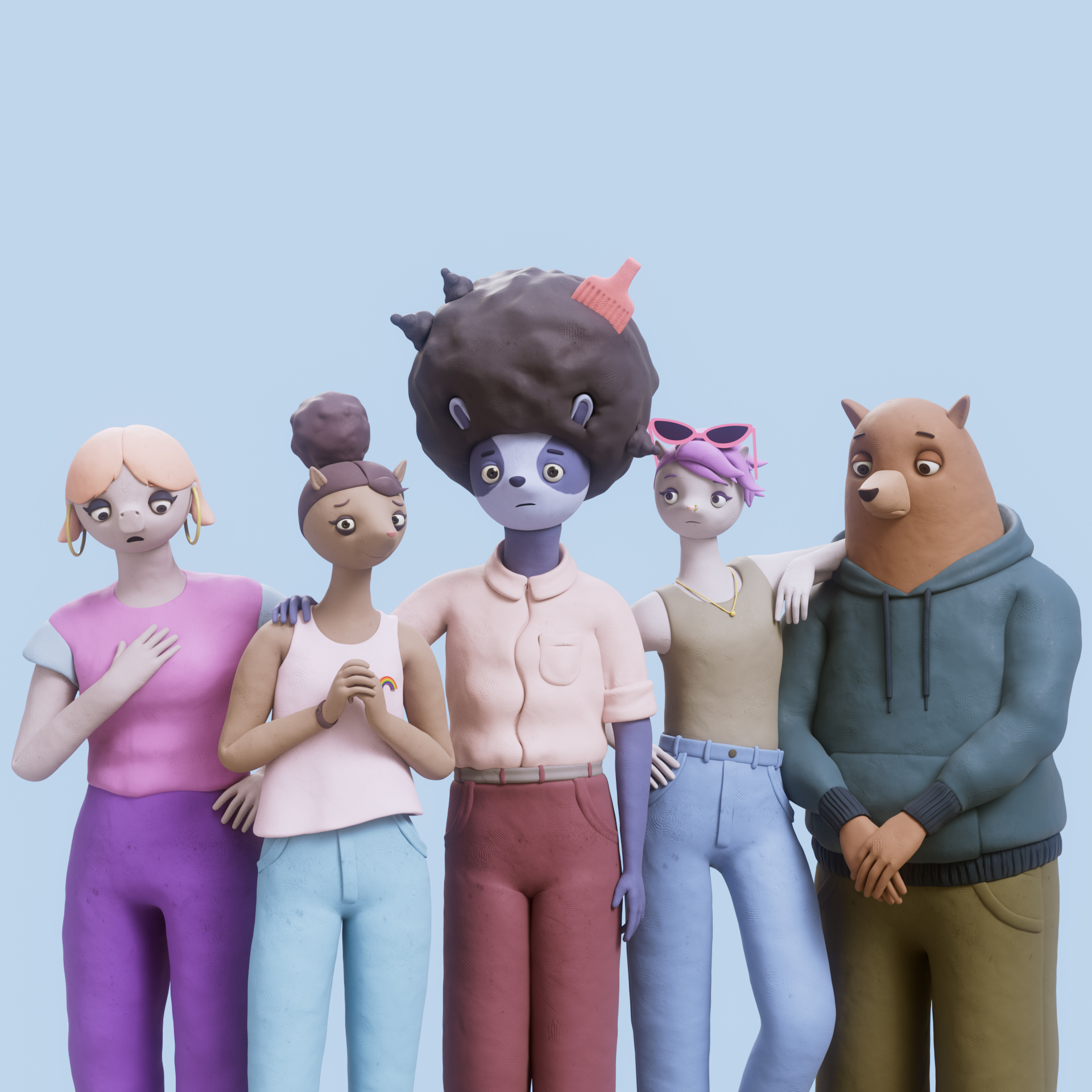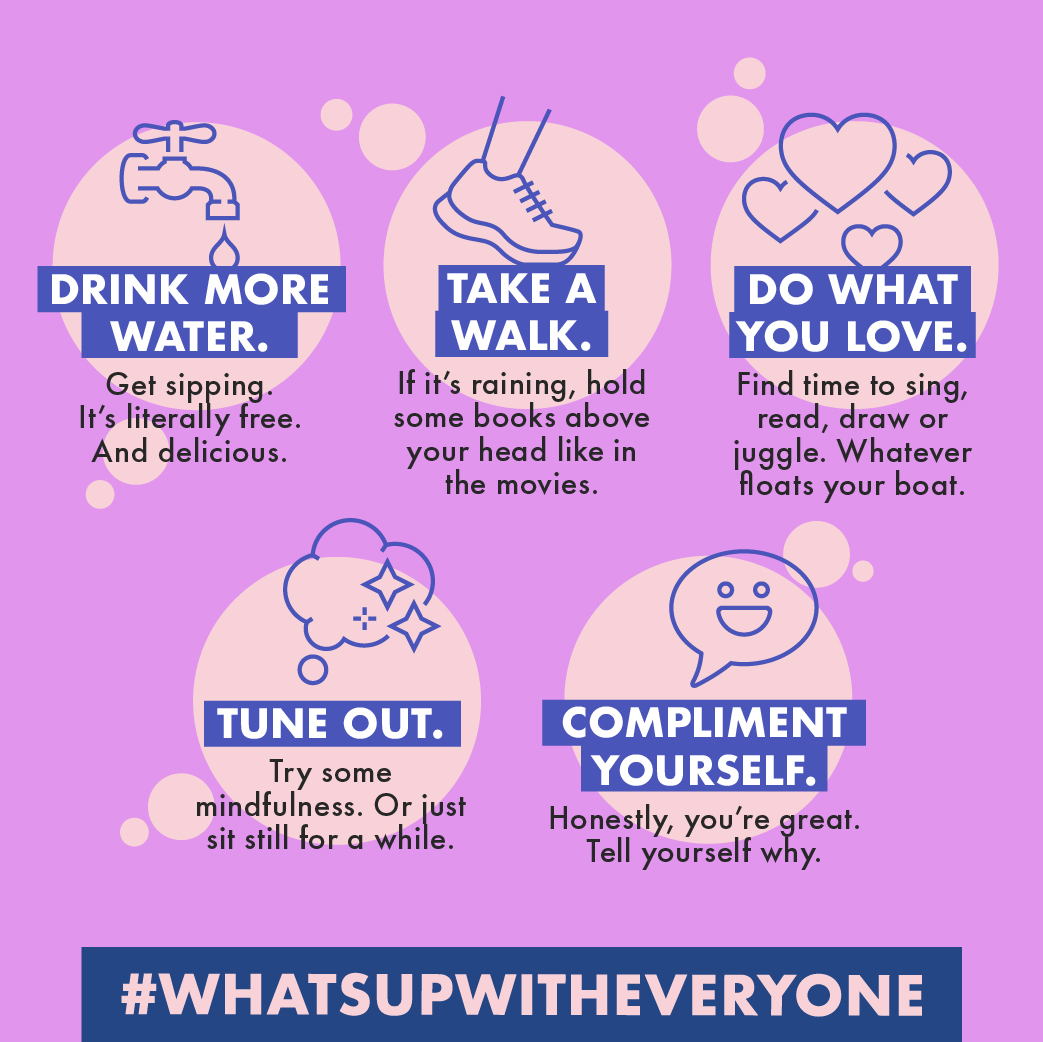Monday, 08 February 2021
Experts from the University of Nottingham have joined forces with Aardman, the award-winning independent studio, on a campaign to encourage young people to become more aware of the factors that may be having a negative impact on their mental wellbeing.
Called ‘What’s Up With Everyone?’, the campaign sees the launch of a series of short films aimed at young people aged 17-24, and has been uniquely co-created with the young audience it sets out to support, ensuring it has an authentic voice and is genuinely representative of the challenges to mental wellbeing faced by the demographic.
The films, which launch across social media this week alongside a supporting website, introduce five characters, each of whom is contending with an issue related to loneliness, perfectionism, competitiveness, independence and social media - five of the most common issues negatively impacting young people, according to the campaign’s research.
The campaign was led by Professor of Health Humanities Paul Crawford, with support from Dr Sachiyo ito-Jaeger and Dr Elvira Perez Vallejos from the University of Nottingham, along with research teams including Loughborough University, the London School of Economics and Politics; the Mental Health Foundation and mental wellbeing charity, Happy Space; and with young people's mental health expert, Dr Dominique Thompson.
 #Whatsupwitheveryone
#Whatsupwitheveryone
The partnership comes at a time when the pandemic has increased the focus on youth mental wellbeing, with reports that two thirds of young people have experienced worse mental health during the period of lockdown restrictions[1].
A recent NHS survey also showed that one in six children and young people had a probable mental health disorder in July 2020, compared to one in nine in 2017[2], whilst the Office for National Statistics (ONS) discovered that more than half of all students at University (57%) reported a worsening in their mental health and well-being since the beginning of the autumn term in September 2020[3]
The collaborative project – informed by research commissioned and funded by the Arts and Humanities Research Council (AHRC) that involved Loughborough University’s Storytelling Academy – will develop and evaluate the impact of a series of animated stories aiming to increase young people’s mental health literacy.
 #Whatsupwitheveryone
#Whatsupwitheveryone
Professor Paul Crawford from the School of Health Sciences at the University of Nottingham, and Principal Investigator of the project, said: “These wonderful short animated stories should help all our young people to think about, and explore solutions to the kind of mental health challenges that come with difficult life transitions, such as heading off to university or college or starting in training or employment. The films and supporting online resources will be very welcome at this time, with all the disruption and anxieties in the wake of the coronavirus pandemic."
“As well as providing a much needed mental health resource, this campaign forms part of a wider research project that will also evaluate how effective these creative platforms are as a way of reaching the young people who need it, and ensuring help and guidance is easily accessible.
Daniel Binns, Animation Director at Aardman Animations, said: “We set out to produce short films which young people could relate to, something that felt genuine and honest. We wanted to create content that could come up on someone’s social media and elicit the response 'I know that feeling'. We want people watching them to see a little of themselves in the characters and their stories and that be the start of thinking about how they feel, or cope and how it could be better.
“What really sets this project apart is that it's been co-created with young people at every step. Their input alongside those of our experts, has been invaluable and enlightening, enabling us to craft authentic and effective resources that can make a genuinely positive impact.”
Dr Dominique Thompson, Clinical Advisor for the project, said: "I have dedicated a lot of my life to working with young people and understanding their mental wellness in particular, which is why I’m delighted to be working closely with Aardman on this unique campaign. Through creating another avenue to help support the next generation of society, we hope that this campaign will really encourage young people to think about the world they live in and reflect on how they respond to it, so that they stay happy and healthy."
Dr David Crepaz-Keay, Head of Applied Learning at the Mental Health Foundation, said “It has never been more important to encourage people to understand what they can do to support their own and each other’s mental health. These resources will enable students to be at the heart of conversations about mental health and how we protect and improve it for generations to come.”
To find out more about the campaign, please visit:
Story credits
[1] https://www.mind.org.uk/media-a/5929/the-mental-health-emergency_a4_final.pdf
[2]https://www.england.nhs.uk/2020/10/nhs-encourages-children-and-young-people-to-seek-help-as-new-data-shows-rise-in-mental-health-problems/
[3] https://www.ons.gov.uk/peoplepopulationandcommunity/healthandsocialcare/healthandwellbeing/bulletins/coronavirusandhighereducationstudents/england20novemberto25november2020
Notes to editors
More information is available from Professor Paul Crawford from the School of Health Sciences at the University of Nottingham at paul.crawford@nottingham.ac.uk
The campaign forms part of an Arts and Humanities Research Council (AHRC) funded collaborative research project between Aardman, and the Universities of Nottingham, Loughborough and LSE and Mental Health Foundation.
More about the research project:
This Arts and Humanities Research Council (AHRC) funded collaborative campaign and partnership, led by Professor of Health Humanities Paul Crawford at the University of Nottingham, develops and evaluates the impact of a series of animated stories and a supporting website that aim to increase young people's mental health literacy. In partnership with Aardman Animations, the universities of Nottingham, Loughborough and London School of Economics and Politics, Mental Health Foundation, Happy Space and clinical adviser, Dr Dominique Thompson, the overall project aims to deliver both a popular much-needed, upstream resource and evidence base in the area of young people’s mental health.
About Aardman Animations:
Aardman Animations, based in Bristol (UK) and co-founded in 1976 by Peter Lord and David Sproxton, is an independent and multi-award-winning studio. It produces feature films, series, advertising, games and interactive entertainment - such as the ‘visually astonishing’ (Guardian), BAFTA® nominated console game, 11-11: Memories Retold, and the four-times Gold Cannes Lions-winning StorySign app - and innovative attractions for both the domestic and international market, including a new 4D theatre attraction at Efteling in the Netherlands.
Its productions are global in appeal, novel, entertaining, brilliantly characterised and full of charm reflecting the unique talent, energy and personal commitment of the Aardman team. The studio’s work – which includes the creation of much-loved characters including Wallace & Gromit, Shaun the Sheep and Morph – is often imitated, and yet the company continues to lead the field producing a rare brand of visually stunning content for cinema, broadcasters, digital platforms and live experiences around the world.
The studio runs the Aardman Academy which has a commitment to nurturing talent by delivering excellence in film and animation training and mentoring. The Aardman Academy offers a variety of courses from intensive one-day workshops teaching production skills and storyboarding, to comprehensive twelve-week courses for professionals in craft based subjects from model making to animation.
In November 2018 it became an Employee Owned Organisation, to ensure Aardman remains independent and to secure the creative legacy and culture of the company for many decades to come. www.aardman.com
About the Arts and Humanities Research Council:
The Arts and Humanities Research Council (AHRC), part of UK Research and Innovation, funds internationally outstanding independent researchers across the whole range of the arts and humanities: history, archaeology, digital content, philosophy, languages and literature, design, heritage, area studies, the creative and performing arts, and much more. The quality and range of research supported by AHRC works for the good of UK society and culture and contributes both to UK economic success and to the culture and welfare of societies across the globe.
You can find out more information via ahrc.ukri.org or following us on Twitter at @ahrcpress
About the Mental Health Foundation:
The Mental Health Foundation is the leading charity for everyone’s mental health. With prevention at the heart of what we do, we aim to find and address the sources of mental health problems so that people and communities can thrive. We are also the home of Mental Health Awareness Week. This takes place from 10-16 May this year and the theme is “Nature and the Natural Environment”. For more information about the Foundation visit www.mentalhealth.org.uk
Notes to editors:
About the University of Nottingham
Ranked 24 in Europe and 15th in the UK by the QS World University Rankings: Europe 2024, the University of Nottingham is a founding member of Russell Group of research-intensive universities. Studying at the University of Nottingham is a life-changing experience, and we pride ourselves on unlocking the potential of our students. We have a pioneering spirit, expressed in the vision of our founder Sir Jesse Boot, which has seen us lead the way in establishing campuses in China and Malaysia - part of a globally connected network of education, research and industrial engagement.
Nottingham was crowned Sports University of the Year by The Times and Sunday Times Good University Guide 2024 – the third time it has been given the honour since 2018 – and by the Daily Mail University Guide 2024.
The university is among the best universities in the UK for the strength of our research, positioned seventh for research power in the UK according to REF 2021. The birthplace of discoveries such as MRI and ibuprofen, our innovations transform lives and tackle global problems such as sustainable food supplies, ending modern slavery, developing greener transport, and reducing reliance on fossil fuels.
The university is a major employer and industry partner - locally and globally - and our graduates are the third most targeted by the UK's top employers, according to The Graduate Market in 2024 report by High Fliers Research.
We lead the Universities for Nottingham initiative, in partnership with Nottingham Trent University, a pioneering collaboration between the city’s two world-class institutions to improve levels of prosperity, opportunity, sustainability, health and wellbeing for residents in the city and region we are proud to call home.
More news…